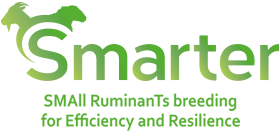
This project has received funding from the European Union’s Horizon 2020 research and innovation programme under grant agreement No 772787.
2 New partners in our SMARTER project: AbacusBio and CNR
AbacusBio

Tim Byrne – copyright AbacusBio
AbacusBio are specialists in breeding program design and evaluation in livestock, crop, forestry and aquaculture industries. The company has recently become a partner in SMARTER as leaders of Work Package 7 (WP7). AbacusBio will provide advice on methodologies and tools to support the project partners in the development of balanced breeding goals for agro-ecological resilience. As well supporting WP7, AbacusBio will complete task 7.4; this task involves quantifying the responses to selection in novel efficiency and resilience traits and identifying any trade-offs between genetic gain in these traits and productions traits, across breeds and systems. A key part of AbacusBio’s role will therefore be to combine findings from other Work Packages (such as novel efficiency and resilience trait definitions and variance components) with novel economic and participatory trait weightings, developed in WP7. AbacusBio have broad experience in designing breeding goals and simulating breeding programs that balance economic, environmental and social traits, and hopes to be able to support WP7 and the SMARTER project to generate meaningful breeding program outcomes.
CNR

Alessandra Stella – copyright CNR
The Institute of Agricultural Biology and Biotechnology is part of the National Research Council of Italy and has a solid expertise in genomic analysis, bioinformatics and biostatistics. The main involvement in SMARTER is in the management of data storage, analysis and integration and in the genomic characterization of hardy or underutilised breeds’ environmental adaptation (WP4). In particular, integration of heterogeneous genotypic data (different genotyping platforms, builds of the genome, re-sequencing data) and phenotypic information will be applied to study genetic diversity and demography. Data produced within the project will be managed differently for short-term and long-term storage. A local repository, suitable for application of data standardization and integration tools, will be developed and managed locally, allowing privacy and secured access to SMARTER partners. In the meanwhile, suitable archives and suites for long-term data storage will be identified and appropriated automation will be prepared for data preparation and submission. Protocols and tools for data querying will be prepared in collaboration with DB curators

